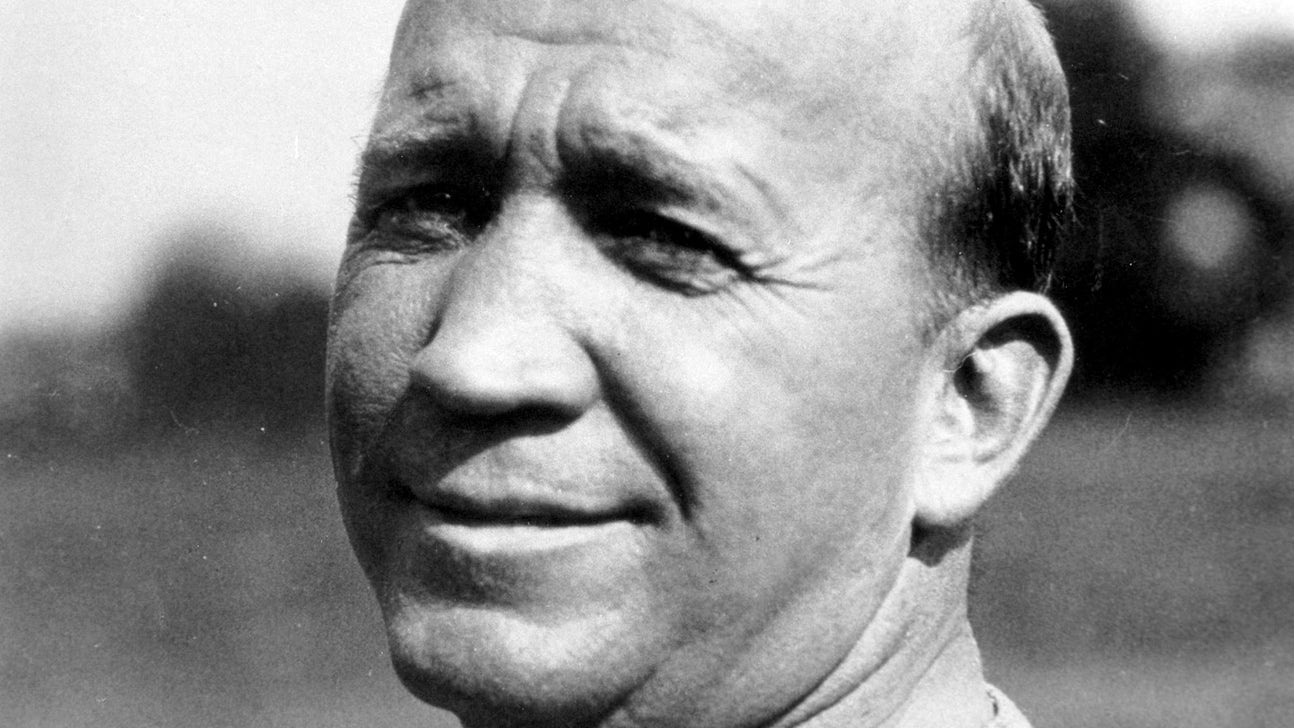
One question for Notre Dame legend Knute Rockne: Was 'Gipper' a lie?

Between March 4, 1888, when he was born in Norway, and March 31, 1931, when he died in a plane crash in Kansas, Knute Rockne became known for many things.
He was an iconic football coach at Notre Dame who coached the "Four Horsemen" of 1924 -- Harry Stuhldreher, Don Miller, Jim Crowley and Elmer Layden.
He helped popularize the forward pass, catching throws from quarterback Charlie Dorais as Notre Dame beat Army in 1913, a game that changed how people thought football could be played schematically.
He was an undeniable winner, racking up a 105-12-5 record and six national titles in 13 seasons as the Fighting Irish's head coach, producing an .881 winning percentage that is the highest ever for major college football.
He infamously decided not to coach against Carnegie Tech in 1926, instead going to watch Army-Navy for various reasons (depending on which version you believe), while the Irish were protecting a perfect record. They lost to Carnegie, which probably ruined their chance at a national championship. (Note: That's an unbelievable story. Literally, it's not believable in our modern sports culture that a coach would just decide to skip a game, let alone the coach of an undefeated team chasing a title, for any reason other than a serious personal matter.)
But by far the thing Rockne came to be known for, at least to a mass audience, was this line: "Win one for the Gipper." It's become a permanent piece of American popular culture and is a staple of the sports underdog narrative.
The only problem?
Nobody knows if the "Gipper" line -- one of the MOST FAMOUS LINES IN AMERICAN CULTURE -- is true at all or just a complete lie.
I found myself down this rabbit hole while innocently reading some Rockne clips on the 84th anniversary of his death. Here's how the story goes, at least as we think we know it:
Notre Dame star George Gipp was hospitalized near the end of his senior season and died on Dec. 14, 1920, from pneumonia. As legend has it, Gipp said these words to Rockne while on his deathbed: "Rock, sometime, when the team is up against it and the breaks are beating the boys, tell them to go out there with all they got and win just one for the Gipper. I don't know where I'll be then, Rock, but I'll know about it and I'll be happy."
Eight years later, in a game against Army, Rockne apparently pulled those lines from his memory at halftime to inspire the Irish, and Notre Dame did go on to beat Army 12-6. The story was immortalized in the next day's New York Daily News with a "Gipp's Ghost Beat Army" headline but then sat relatively idle for more than a decade.
It wasn't until 12 years later that the line started to become entrenched in American culture. In the 1940 film "Knute Rockne -- All American," Ronald Reagan -- yes, THAT Reagan -- played Gipp and recited those words in this scene to Rockne (played by Pat O'Brien):
Reagan would then use "win one for the Gipper" as the rallying cry in political campaigns on his run to becoming the 40th president of the United States, and he said those words to George H.W. Bush after he won the 1988 election.
And so "win one for the Gipper" became a line forged for eternity.
But historians who've studied Notre Dame football and Rockne at length -- to say nothing of hack columnists interested in impaling the Fighting Irish mystique -- question that entire legend.
Jack Cavanaugh, the author of a George Gipp biography called "The Gipper," wrote about his doubts for the New York Daily News a few years ago. Here are some of the things that have caused suspicion for Cavanaugh:
* Rockne took eight years -- 1920 to 1928 -- to pull out his "win one for the Gipper" material. Why? Did a man that competitive and charismatic not find ONE opportunity desperate enough in those intervening years for him to use the speech?
* According to Cavanaugh's research, none of Gipp's teammates called him "Gipper."
* Gipp was not a sentimental person. He was a carefree spirit who loved pool and cards and parties. Hunk Anderson, a close friend and teammate of Gipp, told Cavanaugh that he doubted Gipp would ever say something like "win one for the Gipper."
* Rockne was known by all as a master motivator and great speaker, and it was completely believable that he would make up lies to inspire his team because he did it all the time in his locker room speeches. "They were all lies, blatant lies," said Crowley, one of the Four Horsemen. How far would Rockne go for a victory? He once lied about his 6-year-old son being hospitalized and begging for a Notre Dame win. His 6-year-old son! To win a football game!
There are even more questions about Gipp and Rockne that cast almost everything about the "win one for the Gipper" tale into question.
I have no idea what to believe. I'm just confused. It's impossible to believe the legend in full with Notre Dame historians discounting the tale, but it's also impossible to say for sure that it ISN'T true, because there isn't one definitive explanation of what happened in December 1920.
Maybe Rockne was at Gipp's bedside, maybe he wasn't. Maybe Gipp actually said, "Win one for the Gipper," maybe he didn't. Maybe Rockne could take whatever a dying man said and completely change it all to win a football game, maybe he couldn't. Maybe we have believed one of the greatest American pop culture lies for decades, maybe we haven't.
Teddy Mitrosilis works in content production at FOX Sports Digital. Follow him on Twitter @TMitrosilis and email him at tmitrosilis@gmail.com.